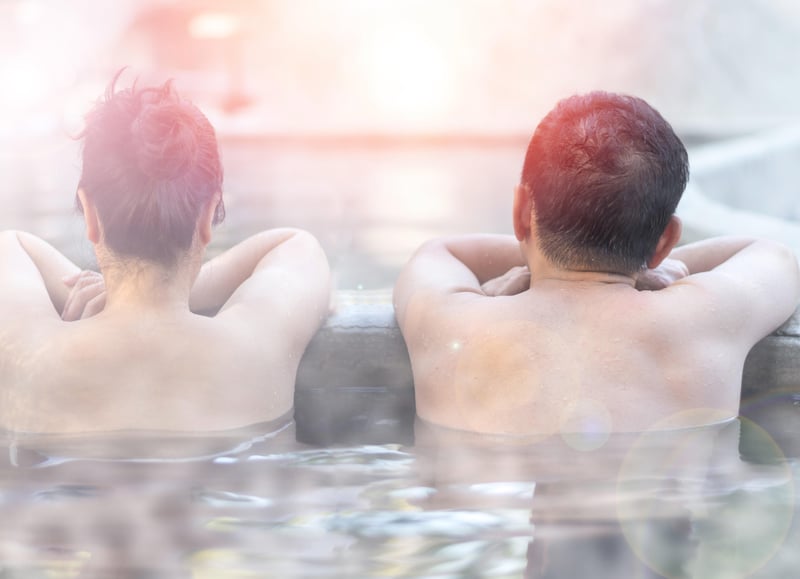Get Healthy!

- Alan Mozes
- Posted December 27, 2022
Could Soaking in a Hot Spring (or Tub) Ease High Blood Pressure?
Could taking hot baths at night help seniors keep high blood pressure at bay? A new Japanese study suggests it just might work.
The finding follows a fresh analysis of a decade-old survey that looked at high blood pressure risk among older residents of Beppu.
Beppu is a city widely known for having the most natural hot springs in all of Japan. And the new analysis revealed that those seniors who routinely opted for a hot spring dip after 7 p.m. appeared to have a 15% lower risk for high blood pressure.
"I was surprised at our results,"study author Dr. Satoshi Yamasaki said as he discussed his team's research into the hot spring bathing habits and medical histories of roughly 11,000 locals aged 65 and up.
The number of seniors surveyed back in 2011 represented about one-third of all older people living in Beppu at the time, explained Yamasaki, a lecturer of internal medicine at Kyushu University Beppu Hospital in Japan. And nearly 4 in 10 either had high blood pressure when surveyed or had a history of high blood pressure, he noted.
All survey respondents were asked to reveal details regarding their prior history of physical and mental illnesses, including high blood pressure, depression, heart disease, stroke, gout, asthma, diabetes, kidney disease and allergies, among others.
In addition, all those interviewed reported on their spring-bathing habits, including how often they went for a soak, how long they typically bathed, the time of day they typically went, and how many years they had been doing it.
In the end, the team concluded that routinely taking a hot spring dip at night was, in fact, "significantly protective"when it came to reducing high blood pressure risk among Japanese seniors.
As to why, Yamasaki said his team theorized that, on the one hand, it likely has to do with a nighttime bath's ability to help lower stress.
On the other hand, it also might be somewhat powered by the positive impact such evening dips have on helping seniors fall asleep more quickly afterwards, given prior investigations that have indicated that falling asleep more quickly at night leads both to better sleep and lower blood pressure.
Yamasaki and his team did point out that their analysis did not account for other lifestyle choices that might have also had a protective impact on blood pressure.
Nor did they account for whether (or how) any of the survey respondents had been treating their high blood pressure medically at the time.
And the degree to which the link seen between hot spring bathing and lower high blood pressure risk might also extend to other types of hot bathing at night remains an open question, Yamasaki noted.
"It is possible that body heating by warm shower or bath -- not [just] hot-spring bathing -- at night might improve sleep,"Yamasaki suggested.
If so, hot showers and nighttime baths might offer effective blood pressure control, he added, though Yamasaki emphasized that just how effective will require more research.
Meanwhile, Yamasaki -- whose team's findings were published online recently in the journal Scientific Reports -- suggested that "nighttime hot bathing [should] be encouraged among older individuals at risk for high blood pressure"as an additional measure to be taken after all traditional standards of care are followed first.
Those standards include taking prescription blood pressure control medications, restricting salt intake, and taking steps to lose weight, exercise more and reduce alcohol intake, he added.
Indeed, such steps are all critical lines of defense when it comes to reducing the risks that would otherwise come with uncontrolled high blood pressure, said Dr. Gregg Fonarow.
Though not involved in the Japanese analysis, Fonarow is director of the Ahmanson-UCLA Cardiomyopathy Center, and co-director of UCLA's Preventive Cardiology Program in Los Angeles.
On an encouraging note, Fonarow said that while high blood pressure significantly increases the risk for heart attacks, heart failure, stroke, chronic kidney disease and premature death, the condition is also a decidedly "modifiable"concern that can be brought under control.
"A variety of lifestyle factors can impact blood pressure levels,"said Fonarow, "including level of physical activity, body weight and diet."
And he agreed that less stress and improved sleep quality have "also been associated with lower blood pressure levels."
But heart-healthy lifestyle choices are only part of the picture, said Fonarow, who noted that most patients battling high blood pressure will also require prescription medications "to get and keep their blood pressure at healthy levels."
More information
There's more on lifestyle choices to help manage blood pressure risk at the Mayo Clinic.
SOURCES: Satoshi Yamasaki, MD, PhD, lecturer, department of internal medicine, Kyushu University Beppu Hospital, Beppu, Japan, and department of hematology and clinical research institute, National Hospital Organization, Kyushu Medical Center, Fukuoka, Japan; Gregg Fonarow, MD, director, Ahmanson-UCLA Cardiomyopathy Center, co-director, UCLA's Preventative Cardiology Program, and co-chief, UCLA division of cardiology, Los Angeles; Scientific Reports, Dec. 20, 2022, online







